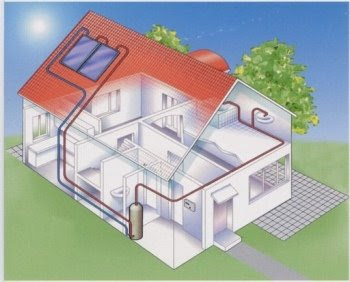
Utilizing energy of the sun to heat water is one of the oldest forms of solar technology available. The first commercial solar hot water heater was patented by Baltimore inventor Clarence Kemp in 1891 (he called his solar water heater the Climax), and since then improvements in performance, design, and level of complexity have made solar water heaters the perfect choice for homeowners looking to go green and create more sustainable home.
There are several different types solar water heaters, including those with pumps and those that work passively. Basically, solar water heating systems have two main parts: a hot water storage tank and some type of collector that absorbs solar energy. The most modern solar water heaters mount flush with a home's roof and resemble skylights. Geographic location, collector orientation, and collector size will determine how much energy can be provided for domestic hot water heating.
On an average single-family residence, there will typically be one or two solar collector panels on the roof. Some homeowners use the solar water heating system exclusively (sometimes with a gas or electric tankless water heater as a backup energy source), while others pair them with other systems as pre-heaters.
Solar water heating systems cost depends on a number of factors, such as the size of the system and the particular system manufacturer, the number of people in the household, the current hot water usage, the type of roof it is going to sit on, trees causing shadows, etc. The typical solar heating system costs in the range of $2,000 - $6,000. Any solar rebates and other incentives available in your area will reduce the total cost. You can find more detailed information about it at www.dsireusa.org (for USA customers).
Using solar energy to meet part or all of your home's domestic hot water needs have a good economic payoff and can be a valuable and cost effective option to invest. When correctly installed, a solar hot water system can reduce your water-heating bills 50-80%, depending upon water consumption. With a solar water heating system, you'll get the hot water your household needs, save electricity which means saving money, reduce your dependence on coal-fired power and benefit the environment. Saving electricity means reducing emissions created by burning fossil fuels and water consumption at power stations, thus taking steps to save the environment. When a water heating system is combined with an electric water heater, pollutant emissions are reduced by about 2,800 pounds per year. A solar system replacing natural gas will reduce pollution by 1,200 to 1,600 pounds annually.
Solar water heaters pay for themselves in four to eight years and should function for 20+ years.
There are several different types solar water heaters, including those with pumps and those that work passively. Basically, solar water heating systems have two main parts: a hot water storage tank and some type of collector that absorbs solar energy. The most modern solar water heaters mount flush with a home's roof and resemble skylights. Geographic location, collector orientation, and collector size will determine how much energy can be provided for domestic hot water heating.
On an average single-family residence, there will typically be one or two solar collector panels on the roof. Some homeowners use the solar water heating system exclusively (sometimes with a gas or electric tankless water heater as a backup energy source), while others pair them with other systems as pre-heaters.
Solar water heating systems cost depends on a number of factors, such as the size of the system and the particular system manufacturer, the number of people in the household, the current hot water usage, the type of roof it is going to sit on, trees causing shadows, etc. The typical solar heating system costs in the range of $2,000 - $6,000. Any solar rebates and other incentives available in your area will reduce the total cost. You can find more detailed information about it at www.dsireusa.org (for USA customers).
Using solar energy to meet part or all of your home's domestic hot water needs have a good economic payoff and can be a valuable and cost effective option to invest. When correctly installed, a solar hot water system can reduce your water-heating bills 50-80%, depending upon water consumption. With a solar water heating system, you'll get the hot water your household needs, save electricity which means saving money, reduce your dependence on coal-fired power and benefit the environment. Saving electricity means reducing emissions created by burning fossil fuels and water consumption at power stations, thus taking steps to save the environment. When a water heating system is combined with an electric water heater, pollutant emissions are reduced by about 2,800 pounds per year. A solar system replacing natural gas will reduce pollution by 1,200 to 1,600 pounds annually.
Solar water heaters pay for themselves in four to eight years and should function for 20+ years.



9 comments:
I am read your article and i learned something new today...thanks !
Hi
Not just friendly and beneficial for one's economy, Solar Heating systems are also very environment friendly and use energy generated from the Sun's light in order to heat up the water. With efficient storage facilities being a part of the complete system, water remains hot throughout the day and night, providing you with a source of hot water at all times.
Solar Energy is the most easily available and free source of energy. It is the most important out of non-conventional sources of energy too, it is non polluting, available for all and convenient source therefore helps in lessening the greenhouse effect.
solar power hot water heaters
Using solar energy to meet part or all of your home's domestic hot water needs have a good economic payoff and can be a valuable and cost effective option to invest.
Solar water heaters usually go in pair with electric heaters as a way to supplement heating during the winter time.
Really very nice article .It's a very useful information.Thanks
Without a tempering valve, reduction of the water heater's setpoint temperature is the most direct way to reduce scalding. However, for sanitation, hot water is needed at a temperature that can cause scalding.
Post a Comment